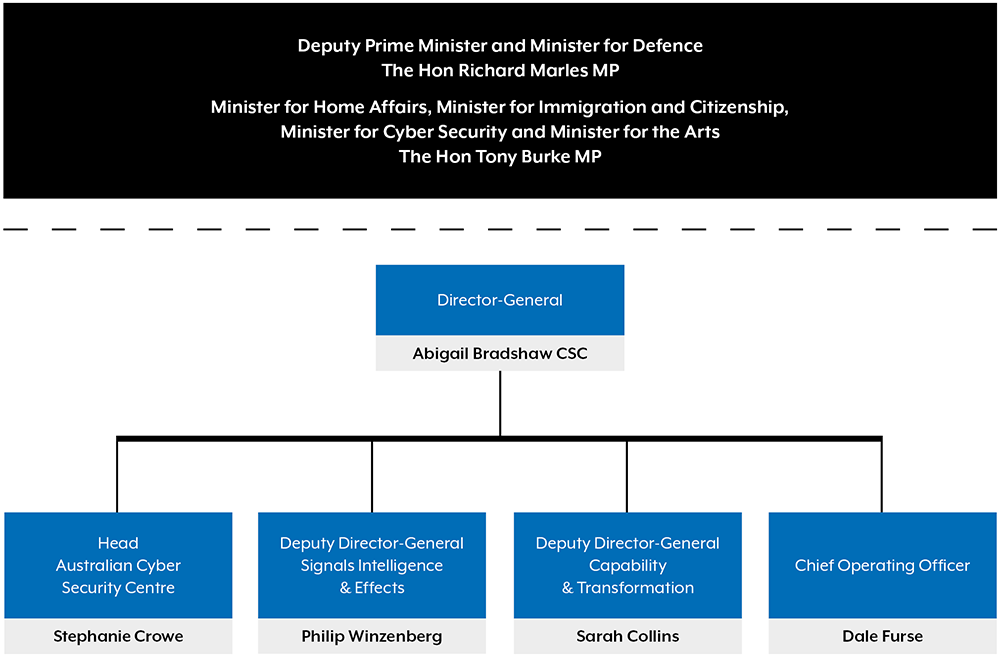The Australian Signals Directorate (ASD) is a vital member of Australia’s national security community. We work across the full spectrum of operations required of contemporary signals intelligence and security agencies. This includes foreign intelligence, cyber security and offensive cyber operations supporting the Australian Government and Australian Defence Force (ADF).
We employ talented and dedicated people with diverse skills willing to overcome challenges in support of Australia’s interests. ASD is a world-class intelligence, covert effects, and cyber security agency because of the talented, inventive and diverse people that comprise the organisation, and the innovative technologies they employ.
ASD is a statutory agency within the Defence Portfolio with functions established by the Intelligence Services Act 2001, and its priorities are set by the National Security Committee of Cabinet. The ISA specifies that the organisation’s functions are to:
- collect foreign signals intelligence
- communicate foreign signals intelligence
- prevent and disrupt offshore cyber-enabled crime
- provide cyber security advice and assistance to Australian governments, businesses and individuals
- support military operations
- protect the specialised tools ASD uses to fulfil its functions
- cooperate with, and assist, the national security community’s performance of its functions.
A unique team
The organisation seeks to recruit and develop a curious and imaginative workforce which is not deterred by difficult challenges.
This combination of a uniquely skilled workforce, empowered by innovative technology, enabled by responsible financial management, and leveraging partner capabilities, positions the organisation to deliver trusted intelligence, cyber security expertise and offensive cyber operations for Australia’s national interest.
Intelligence analysts at ASD play a critical role in analysing intercepted signals, communications, and other intelligence sources. They examine data, apply analytical techniques and produce reports on various topics of interest to the Australian Government. These analysts often specialise in specific regions, technologies, or intelligence disciplines. Analysing foreign signals intelligence requires a systematic approach and a combination of technical expertise, analytical skills, and knowledge of intelligence methodologies.
Technical specialists at ASD are experts in areas such as communications systems and computer networks. They design, develop, and maintain the technical capabilities required for signals intelligence operations. Their expertise is crucial for intercepting and analysing electronic communications, identifying vulnerabilities in information systems, and developing advanced cyber defence capabilities.
Skilled corporate professionals enable ASD to achieve its mission. Working across ASD they perform critical functions to ensure we keep Australia secure. No matter their speciality in project management, finance, policy or HR. They use their expertise to enable the functioning of a modern intelligence agency. Opportunities are available across almost every discipline; the variety of roles are endless.
Minister for Defence
The Minister for Defence is responsible for the Australian Signals Directorate (ASD).
Ms Abigail Bradshaw, CSC
Director-General Australian Signals Directorate

Abigail Bradshaw was appointed the Director-General of the Australian Signals Directorate (ASD) in September 2024.
Abigail previously served as Deputy Director-General ASD and Head of ASD’s Australian Cyber Security Centre (ACSC), responsible for leading the Australian Government’s operational advice and assistance to improve cyber security for Australians and Australian entities. Abigail led ASD’s response to nationally significant cyber security incidents and spearheaded the Government’s cyber security partnership with industry, forging critical partnerships, which underpin Australia’s national resilience.
Abigail has held key national security roles where she has led whole of government operations, as well as policy and international roles, focussing on advancing Australia’s national security agenda domestically and offshore.
Abigail has held senior appointments within the Department of Prime Minister and Cabinet (PM&C), the Department of Home Affairs, and the Department of Immigration and Border Protection.
Abigail began her career in the Royal Australian Navy and was awarded the Conspicuous Service Cross in 2005. She holds a Bachelor of Laws and a Bachelor of Asian Studies.
ASD organisation chart

Deputy Prime Minister and Minister for Defence: The Hon Richard Marles MP
Minister for Home Affairs, Minister for Immigration and Citizenship, Minister for Cyber Security and Minister for the Arts: The Hon Tony Burke MP
Director-General: Ms Abigail Bradshaw CSC
Head Australian Cyber Security Centre: Ms Stephanie Crowe
Deputy Director-General Signals Intelligence and Effects: Mr Philip Winzenberg
Deputy Director-General Capability and Transformation: Ms Sarah Collins
Chief Operating Officer: Mr Dale Furse